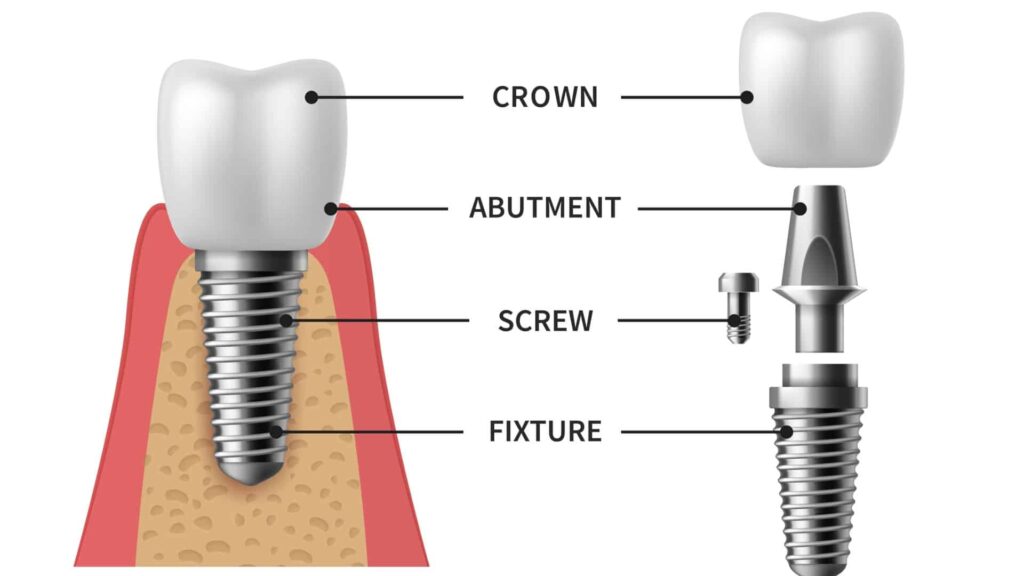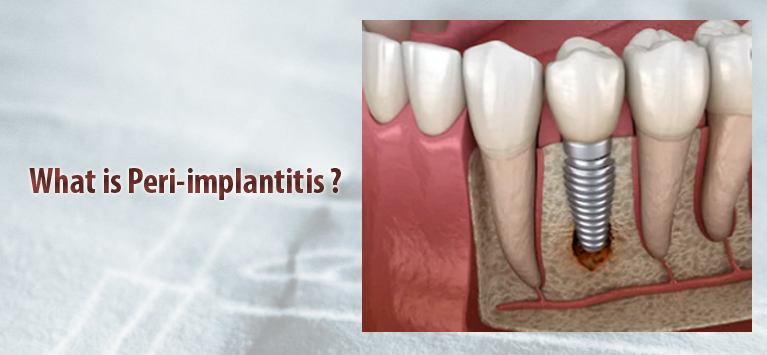
Dental problems have been quite common among people all around the world. Tooth loss has always been a major dental problem, making it difficult to chew and smile properly. However, the solution for this is in the form of “dental implants.” With these implants, you can smile and chew again and feel more confident. All dental procedures demand extreme care before and after the surgical procedure. So, you have to provide proper care to your dental implants. In this comprehensive guide, we’ll discuss how to care for dental implants. We’ll also discuss what dental implants are, what their benefits are, and why we should take care of them.
What are Dental Implants?
Dental implants are tooth-like structures that replace natural teeth. As the name shows, dental implants are medical devices/tools surgically implanted into your jawbone. These help to restore your ability to chew. These implants provide support and act as an anchor for artificial teeth such as bridges or crowns. Implants are different from and considered better than dentures, which are removable artificial teeth.
Structure of a Dental Implant:
A dental implant consists of 3 parts which are:
- Dental implant body
- Dental implant abutment
- Abutment fixation screw


In a dental implant, the implant body is surgically inserted into the jawbone, which is then attached to the dental implant abutment with the help of an abutment screw. It is then extended through the gums into the mouth.
Benefits of Dental Implants
Dental implants are the best possible option for natural and healthy teeth. You will get the following benefits after getting dental implants:
- They are a perfect replacement for a lost tooth.
- They are not prone to moving or slipping. Hence, they are just as stable as natural teeth.
- Implants keep your jawbone and face in place.
- You can chew and smile again.
Dental implants are the best replacement for a lost tooth.
Why Should You Care For Your Dental Implants?
Since implants are like real or natural teeth, they give you a proper smile and confidence. These implants help your mouth to function correctly. Once you have your dental implants, good care is required as it prolongs their lifetime and maintains their appearance. If you do not provide adequate care to your dental implants, it can lead to significant issues, which may include:
- Bone loss
- Discomfort
- Gum disease like Peri-implantitis
- Inflammation
Proper care can help protect your implants from any injury and increase their lifetime.
What is Peri-Implantitis?
Peri-implantitis is a gum disease of your implants in which your gums become inflamed and red. Gums become more sensitive and may bleed with brushing or flossing. You may also need help with eating. The worst it can do is that peri-implantitis can cause your implants to fall out.


How to Care for Dental Implants?
Dental implants are essential as they can be better than natural teeth. They are not prone to tooth decay once provided the proper care. If you want to have these implants for a lifetime, you must follow these tips:
Using a Soft-Bristled or Nylon Toothbrush
There is a general concept that hard-bristled toothbrushes help clean your teeth well. They can help to remove particles or plaques from teeth. But in reality, they can damage the enamel on your teeth. They can do even more damage to your implants as they can scratch the surface of the implants. So, hard-bristled brushes should always be avoided. It would be best to use soft-bristle or nylon toothbrushes for your teeth or once you have dental implants. To clean the hard-to-reach areas around your implants, you can use Proxabrush. Avoid using metal to clean your implants; brush twice a day and floss regularly.
Using Sensitive Cleaning Products
Once you have dental implants, you must switch to sensitive cleaning products for implants. Using abrasive toothpaste or mouthwash can damage your implants and cause extreme discomfort. It would be best if you avoided ordinary toothpaste and should prefer to use toothpaste for sensitive teeth. You should also avoid oral hygiene products with intense flavors like mint or cinnamon.
Practicing Good Oral Hygiene
Even if you show laziness towards your oral hygiene and ignore your teeth before, you must practice good oral hygiene once you have dental implants. Good oral hygiene may include:
- Avoid baking soda, bleach, chlorine cleaners, or activated charcoal.
- Avoid spitting or sucking through straws after surgery.
- Brush twice daily after having dental implants.
- Do not use your implants as tools for opening purposes.
- Use non-abrasive toothpaste or mouthwash.
- Use implant-specific flossers.
- Use an alcohol-free mouth rinse.
Following the above practices can help improve your implant’s health and life.
Flossing Regularly
Flossing is a dental cleaning technique in which you use a small thread or cord to remove food particles and plaques between the teeth or the places where a toothbrush cannot reach and clean. If you previously followed flossing, flossing regularly after dental implants becomes more important. If you do not floss daily, plaque accumulates around your implants, which is unsuitable for oral hygiene. Moreover, it is advised to use implant-friendly floss. These flosses are usually unwaxed and designed explicitly for teeth with dental implants. Two types of flosses are generally preferred:
Also Read: 10 Reasons Why Do My Gums Hurt After Flossing? A Complete Guide
Water Flossers
Although all flossers are suitable for dental cleaning and oral hygiene, a water flosser is preferred for dental implants. A water flosser can help you kill the bacteria in up to 6mm depth. Water flossers also help to avoid particles that are responsible for peri-implantitis. Most of the water flossers have rubber-tip stimulators. These stimulators are for sensitive gums and hard-to-reach areas between the teeth. Moreover, most dentists prefer water flossers over dental flossers since regular flossers can shed particles. These can lead to peri-implantitis.
Crown and Bridge Flossers
These flosses are specially designed flossers for dental implants. Crown and bridge flosses are used under and around dental implants. When it comes to the structure of a crown and bridge floss, it has:
- Two stiff nylon ends
- A fuzzy middle to clean the surface of the implant
- Porcelain that touches the gum line
You can insert the floss between the dental implants with the help of nylon stiff ends and pull it through the other side. You can use it to clean the implants.
Eating the Right Foods
Once you have dental implants, choose to eat the right foods. Although eating excellent and hygienic food is advised in all conditions, you should take special care once you have implants. You must avoid eating hot, rigid, or sticky food as it can damage your implants. These foods can decrease the lifetime of your implants and can also produce other oral health issues. Here are the reasons why you should avoid these foods hot, rigid, or sticky foods:


- Hard foods can damage or break your dental implants.
- Sticky foods or chewing gums can stick or adhere around your implants and enhance the chances of plaque accumulation.
- Hot foods such as hot soup can distort the implant’s shape.
Some foods that you should avoid once you have dental implants include apples, candies, caramel, carrots, crusty bread, chewing gums, dried fruits, hard-shell tacos, potato chips, steak, too much spice, and small seeds. Avoiding these foods can help your implants’ overall health and lifetime.
Avoiding Alcohol Consumption and Smoking
“Alcohol consumption and smoking are injurious to health.” You have been listening to this advice throughout your life. If you have a habit of alcohol consumption or smoking, you must avoid both once you have dental implants. Dental implants typically take 6 months to heal, and using alcohol or smoking during this period will disturb this healing process. Alcohol is not suitable for regular teeth and implants due to the high quantity of sugar in it. Alcohol also enhances plaque accumulation in your teeth or implants. Moreover, smoking speeds up tooth decay. So, you must avoid alcohol or tobacco for at least the first six months of post-dental implant surgery.
Ensure Regular Visits to Your Dentist
If you have dental implants and wish to keep them for an extended period, ensure regular dentist visits. Although you follow all these tips, you must visit your dentist at least twice a year. It helps keep you aware of your implants and allows your dentist to pick any dental issue in the early stages. These visits will also help ensure no signs of peri-implantitis or damage to your implants.


Using a Mouth Guard for Teeth Grinding
Teeth grinding or Bruxism is an involuntary condition in which you grind or clench your teeth. It mostly happens during sleep but can also occur during stress, concentration, or use of drugs. Teeth grinding is unsuitable for your teeth and can damage your dental implants. Excessive force through teeth grinding results in high-intensity pressure on your teeth or implants. Using a custom mouth guard to protect your teeth or implants would be best.
Taking Medication as Prescribed by Your Dentist
Since dental implants are surgically implanted in place of your natural teeth, there are significant chances of infection. This infection can cause inflammation of the tissues, and it may result in dental implant failure. You should take medication as your dentist prescribes to avoid any risk of infection or dental implant failure.
Immediate Aftercare Tips for Dental Implants
The first 24 hours after your dental implant surgery are crucial as you are going through this process for the first time and will also have to bear some pain and numbness. These are some of the tips you can follow immediately after the dental implant surgery:
- For the first 24 hours, use soft foods only.
- Do not move excessively for 8-12 hours; keep your head elevated.
- Bite on the sponges placed in your mouth. It will help to control bleeding.
- Avoid rinsing your mouth for the first 24 hours after dental implant surgery.
- Hold a pack of ice on your face to avoid numbness when needed.
- Take medications as prescribed by the dentist to prevent infection.
How Long Do Dental Implants Last?
Your dental implants need proper care. Implants screws can last a lifetime with good cleaning and flossing practices. Ceramic crowns usually last up to 10 to 15 years. Implants placed in the front of the mouth have a longer lifetime than the implants placed in the back. As the latter are more actively used for chewing purposes.
Conclusion
Dental implants are the replacement of natural teeth and help your mouth to function correctly. Although dental implants are a more secure and longer-lasting replacement for natural or lost teeth, you must take proper care to achieve these goals. You must also discuss everything with your dentist before and after the dental implant surgery. Take good care of dental implants to have them for a lifetime.

